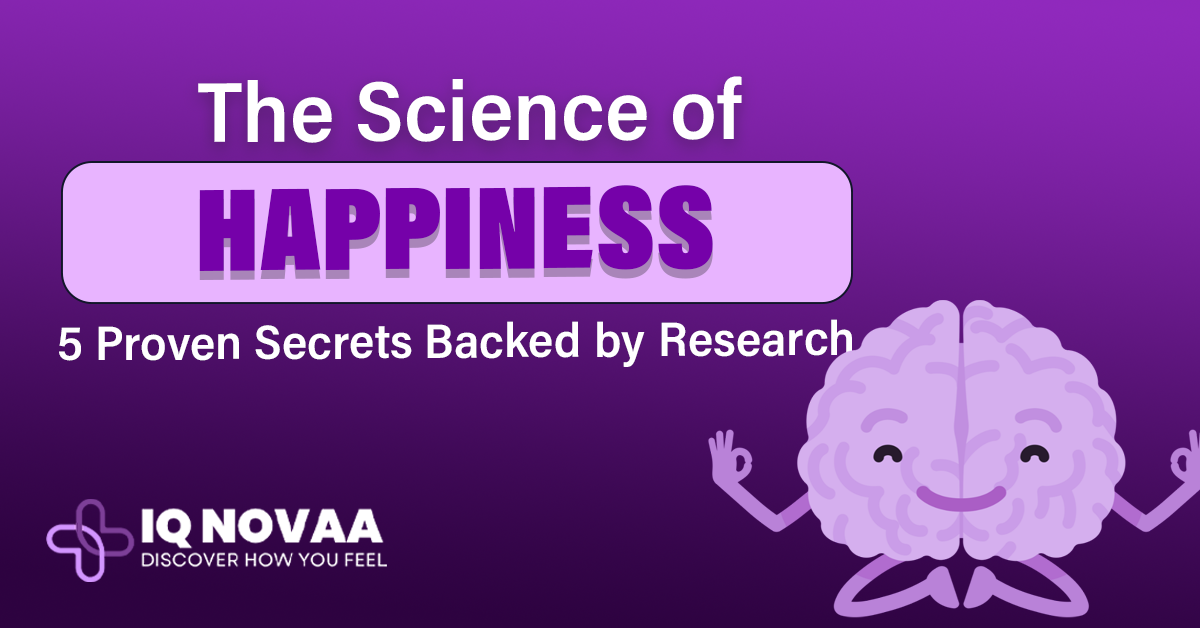Happiness is more than a fleeting emotion; it is a science. In 2025, researchers report that nearly 30% of adults worldwide struggle to maintain daily happiness, emphasizing the importance of understanding what truly boosts life satisfaction (Harvard Study 2025).
Learning the science of happiness can help you improve mood, increase resilience, and enhance your overall well-being. These strategies are not based on guesswork but on decades of research in positive psychology, neuroscience, and behavioral science. By applying these secrets of happiness daily, you can create sustainable joy and mental balance.
This guide will explore five practical, research-backed habits that teach how to be happier scientifically, along with relatable examples you can implement immediately. Additionally, we provide evidence from research on happiness to show why these practices really work
Understanding the Psychology of Happiness
The psychology of happiness explores how our thoughts, emotions, and actions shape long-term well-being. It shows that happiness is not just luck or chance — it is something we can build through daily habits. Research in positive psychology explains that people who regularly practice gratitude, mindfulness, and connection feel happier and less stressed.
In 2025, mental health experts continue to confirm that happiness depends more on mindset than on material success. When we focus on growth, relationships, and purpose, our brain naturally shifts toward optimism and emotional balance. This approach improves life satisfaction and strengthens overall well-being

5 Proven Secrets of Happiness
Studies show that gratitude helps the brain focus on what is going right rather than what is missing. The APA Gratitude Study 2025 found that people who write down three things they are thankful for every morning experience higher life satisfaction and reduced anxiety.
Start by noticing small moments — a calm morning, a kind message, or a good meal. Writing them down trains your mind to see more positive experiences every day.
Quick Tip:book near your bed and list three things you appreciate each morning or before sleeping. Keep a small note
2. Foster Social Connections
One of the strongest predictors of happiness is the quality of our social connections. According to Harvard’s 2024 Happiness Study, people with supportive relationships live longer and report greater emotional health. Spending time with loved ones, joining local communities, or even short positive conversations can increase joy and belonging.
If you often feel isolated, try reaching out to one friend each day or join an online group related to your interests. Positive social contact acts as a natural stress reliever and supports both happiness and mental stability.
For related reading, visit Daily Habits That Improve Mental Health.
3. Engage in Flow Activities
“Flow” means being deeply involved in an activity where time seems to disappear. It happens when we do something that challenges and excites us at the same time — like painting, writing, cooking, or playing a sport.
The Flow Research 2025 review found that people who experience flow regularly report 30% higher overall happiness and reduced stress levels. To include flow in your day, pick one activity that keeps your full attention and do it without distractions for 20–30 minutes.
These focused moments strengthen concentration, creativity, and satisfaction — all key parts of lasting happiness.
4. Mindfulness and Meditation
Mindfulness means paying full attention to the present moment without judgment. It helps us slow down, reduce negative thoughts, and respond calmly to challenges.
The Mindfulness Research 2025 report shows that daily meditation improves life satisfaction and emotional balance within four weeks. Even a few minutes a day can reduce anxiety and improve focus.
Try sitting quietly for five minutes, close your eyes, and notice your breathing. If your mind wanders, gently return to your breath. Over time, mindfulness becomes a simple tool to bring peace into your day.
5. Physical Activity and Exercise
Exercise naturally releases endorphins and serotonin, the chemicals responsible for good mood and motivation. The Mayo Clinic notes that even light daily activity — such as a 20-minute walk, yoga, or stretching — supports mental health and emotional well-being.
Regular movement keeps the mind sharp, lowers stress hormones, and improves self-confidence. You don’t need intense workouts; consistency is what matters most. Choose an activity you enjoy and make it part of your daily routine. Benefits of Exercise on Mood.

Practical Daily Habits for Happiness
You can apply the science of happiness to everyday life through small, realistic actions. These simple habits build emotional strength and balance:
1. Morning Gratitude: Begin your day by thinking of three things you are thankful for. It helps set a positive tone.
2. Social Check-Ins: Talk to someone you care about each day, even for a few minutes.
3. Flow Activity: Spend time doing something you love and lose track of time while doing it.
4. Mindful Breaks: Take short pauses to breathe, stretch, or look outside between tasks.
5. Evening Reflection: End your day by noting what went well. This practice improves sleep and mood.
When done consistently, these habits shift your brain toward a happier, more peaceful state. Over time, you’ll notice more joy in simple moments and a calmer response to life’s challenges.
FAQs About the Science of Happiness
What is the easiest way to increase happiness daily?
Start with gratitude journaling or spending 10 minutes in a flow activity you enjoy.
Can social connections really improve happiness?
Yes, research consistently shows that supportive relationships are among the top predictors of life satisfaction.
How long does it take to feel happier from these practices?
Many notice small improvements within 2–4 weeks with consistent practice.
Does mindfulness really work to increase happiness?
Yes, studies show daily mindfulness improves mood, focus, and emotional regulation.
Can exercise boost happiness quickly?
Even 20 minutes of light exercise releases mood-enhancing chemicals like endorphins and serotonin.
What are flow activities and why do they matter?
Flow activities fully engage your attention, reduce stress, and increase life satisfaction.
How does gratitude affect the brain?
Gratitude rewires neural pathways, increasing positive emotion and reinforcing resilience.
Can happiness be measured scientifically?
Yes, research uses surveys, neurological imaging, and hormonal analysis to quantify joy and life satisfaction.

